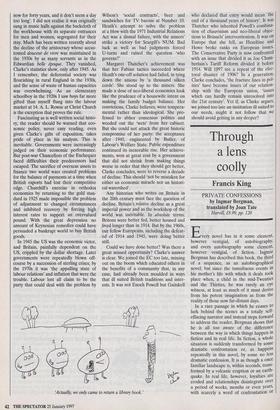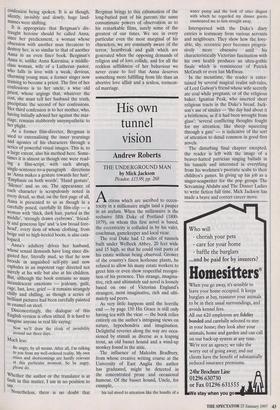Through a lens coolly
Francis King
PRIVATE CONFESSIONS by Ingmar Bergman, translated by Joan Tate Harvig £8.99, pp. 120 Every novel has in it some element, however vestigial, of autobiography, and every autobiography some element, however vestigial, of fiction. Ingmar Bergman has described this book, the third of a sequence, as an autobiographical novel; but since the tumultuous events in his mother's life with which it deals took place when, a child in the mid-Twenties and the Thirties, he was rarely an eye witness, at least as much of it must derive from his potent imagination as from the reality of those now far-distant days. In a rare passage in which he ceases to lurk behind the scenes as a totally self- effacing narrator and instead steps forward to address the reader, Bergman shows that he is all too aware of the difference between the way in which things happen In fiction and in real life. In fiction, a whole situation is suddenly transformed by some dramatic confrontation or, as happens repeatedly in this novel, by some no less dramatic confession. it is as though a once familiar landscape is, within seconds, trans- formed by a volcanic eruption or an earth- quake. In real life, however, loyalties are eroded and relationships disintegrate over a period of weeks, months or even years, with scarcely a word of confrontation or confession being spoken. It is as though, silently, invisibly and slowly, huge land- masses were shifting. It is appropriate that Bergman's dis- traught heroine should be called Anna, since her predicament, a woman whose obsession with another man threatens to destroy her, is so similar to that of another Anna in an even finer book. Bergman's Anna is, unlike Anna Karenina, a middle- class woman, wife of a Lutheran pastor, who falls in love with a weak, devious, charming young man, a former singer now training to become a priest. The first of her confessions is to her uncle, a wise old priest, whose urgings that, whatever the cost, she must tell her husband the truth, precipitate the second of her confessions. Her third confession is to her mother, who, having initially advised her against the mar- riage, remains stubbornly unsympathetic to her plight.
As a former film-director, Bergman is used to externalising the inner yearnings and agonies of his characters through a series of powerful visual images. This is, to a large extent, also his method here. Some- times it is almost as though one were read- ing a film-script, with such abrupt, single-sentence-to-a-paragraph directions as 'Anna makes a gesture towards her hair', Emphasis on both words', 'Hand gesture', Silence' and so on. The appearance of each character is scrupulously noted in every detail, so that, on the first page of all, Anna is presented to us as though in a Carefully posed, carefully lit film-clip — a Woman with 'thick, dark hair, parted in the middle', 'strongly drawn eyebrows', 'friend- ly and generous lips' and 'a low broad fore- head', every item of whose clothing, from beige suit to high-heeled boots, is also cata- logued.
Anna's adultery drives her husband, whose sexual demands have long since dis- gusted her, literally mad, so that he now broods in anguished self-pity and now explodes in an impotent rage directed not merely at his wife but also at his children. B. ut, although the book contains so many incandescent emotions — jealousy, guilt, rage, lust, love, grief — it remains strangely chilly and chilling, as though a series of brilliant pictures had been carefully painted in enamel on steel.
Disconcertingly, the dialogue of this English version is often stilted. It is hard to Imagine anyone in real life saying:
Now we'll draw the cloak of invisibility around our three days...
Much less:
Be angry, by all means. After all, I'm talking to you from my well-ordered reality. My own crises and shortcomings are hardly relevant at this particular moment. So be angry, please do.
Whether the author or the translator is at fault in this matter, I am in no position to say.
Nonetheless, there is no doubt that Bergman brings to this exhumation of the long-buried past of his parents the same consummate powers of observation as to his remarkable films, surely some of the greatest of our times. We see in every particular even the most marginal of his characters, we are constantly aware of the terror, heartbreak and guilt which are generated when the opposing demands of religion and of love collide, and for all the reckless selfishness of her behaviour we never cease to feel that Anna deserves something more fulfilling from life than an abortive love affair and a sexless, torment- ed marriage.



































































 Previous page
Previous page